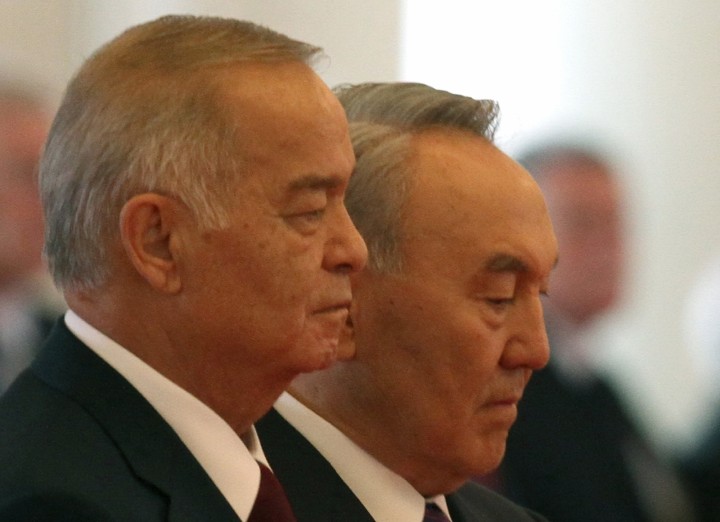 IN 1989, the ruling Politburo of the Soviet Union chose new leaders for two of the empire's Central Asian republics. Twenty-six years later, Nursultan Nazarbayev of Kazakhstan and Islam Karimov of Uzbekistan are still in power. They have weathered the Soviet Union's collapse, wars in Afghanistan and other neighboring nations, the rise of China and the spread of Islamist terrorism with a mix of repression, crony capitalism, corruption and the cultivation of competing powers, including the United States. Now, like leaders across Eurasia, they are wondering if they can survive the revived imperialism of Russia under Vladimir Putin.
IN 1989, the ruling Politburo of the Soviet Union chose new leaders for two of the empire's Central Asian republics. Twenty-six years later, Nursultan Nazarbayev of Kazakhstan and Islam Karimov of Uzbekistan are still in power. They have weathered the Soviet Union's collapse, wars in Afghanistan and other neighboring nations, the rise of China and the spread of Islamist terrorism with a mix of repression, crony capitalism, corruption and the cultivation of competing powers, including the United States. Now, like leaders across Eurasia, they are wondering if they can survive the revived imperialism of Russia under Vladimir Putin.
In the last year Mr. Nazarbayev and Mr. Karimov have watched as Mr. Putin has invaded Ukraine and presided over the collapse of the Russian ruble due to sanctions and falling oil prices. This has dealt a double blow to the two Central Asian nations, whose own currencies and economies have suffered even as their political elite have wondered if Mr. Putin will challenge their sovereignty. Mr. Nazarbayev has particular reason for concern: Some one-fifth of Kazakhstan's population is ethnic Russian, and Mr. Putin has pointedly observed that "there was never a government before" on the "territory" the 74-year-old dictator now rules.
Both rulers have reacted with an old ruse: staging an election. In March, the 77-year-old Mr. Karimov had himself voted into a new term as president, with 90 percent of the ballots. Not to be outdone, Mr. Nazarbayev stood for reelection last month, even though his term had not yet expired, and celebrated winning what was reported to be 97.7 percent of the vote, with a 95 percent voter turnout. "I apologize if these numbers are unacceptable for the superdemocratic countries," he said, unapologetically, at a post-election news conference.
In fact, there were no complaints from Western democracies: President Obama was quick to congratulate Mr. Nazarbayev on his "victory." The administration has responded to the heightened Central Asian anxieties about Russia by recharging its economic and security cooperation. In February, it agreed to supply 300 armored vehicles to Uzbekistan, ignoring Mr. Karimov's record of responding to domestic unrest with military assaults. Deputy Secretary of State Antony Blinken recently outlined a U.S. policy of "strengthening partnerships to advance mutual security" and "forging closer economic ties" with Central Asia while charging that "Russia's actions on its periphery . . . threaten the very foundation of international order."
Mr. Blinken also said that a "critical aspect" of U.S. engagement would be "to advocate forcefully for greater respect for human rights, a stronger voice for civil society and greater religious freedom." But if the administration is actually pursuing those goals, it is having no visible impact. That ought to be worrying because the tired authoritarian tactics of Mr. Nazarbayev and Mr. Karimov are making it less likely that their countries will resist pressure from Mr. Putin. Neither of the aging rulers has lined up non-family successors or even established a process for choosing one. Capable politicians have been jailed or driven out of the country. Independent media are banned.
A policy aimed at preserving the sovereignty of Central Asia should aim first at defending modernizers and reformers and building durable political institutions. Instead, the Obama administration, like the old Soviet Politburo, is betting on the strongmen.
www.washingtonpost.com, May 15 2015




